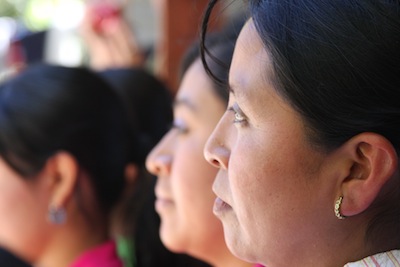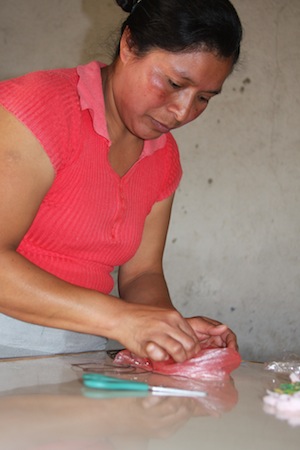On the Impact Road Trip: How Wakami Value Chains are Weaving Change in Guatemala
Editor’s Note: Jesse Grainger, of Agora Partnerships, recently traveled throughout Nicaragua and Guatemala visiting “impact entrepreneurs,” or men and women using the power of private enterprise to solve social, environmental, and economic problems in their local communities. These entrepreneurs are members of Agora Partnerships’ Accelerator Program. Each year, Agora selects a new class of entrepreneurs in Central America and Mexico, and works to connect them with impact investors from around the world. Jesse is chronicling the impact of companies representing the 2011 and 2012 Agora Accelerator Classes.
’He Was Angry’
“He was angry before,” Josefina Quinac says with a smile, referring to her husband’s demeanor before she began working, “but now, he’s different. Things have changed.”
Things are changing in the dusty Guatemalan village of Pastores about 10 km outside the picturesque colonial tourist town of Antigua. Josephina, 44, is a member of the Wakami value chain, one piece of a complex economic development puzzle that starts with a non-profit, is fueled by a business, and ends with real change in the lives of rural women.
Bracelets, Necklaces, and Wakami
In 2003, Guatemalan entrepreneur Maria Pacheco (pictured below) started Kiej de los Bosques (“Kiej” is a Mayan term meaning “harmony between earth and people’”) with a focus on empowering women in rural areas of her native country. According to Pacheco, Guatemalan women typically invest 80-90 percent of their income back into the household. This domestic investment paved the way for improved educational opportunities, healthcare access, and sanitation within rural communities.
 The process begins with Communities of the Earth, a business incubator that targets women in rural villages throughout Guatemala by teaching them how to make bracelets and necklaces. The women who receive the training work together in small groups (called “Wakami Value Chains”) to craft products for Kiej de los Bosques – a Guatemala City-based business that produces an assortment of handicraft products for both national and international consumption.
The process begins with Communities of the Earth, a business incubator that targets women in rural villages throughout Guatemala by teaching them how to make bracelets and necklaces. The women who receive the training work together in small groups (called “Wakami Value Chains”) to craft products for Kiej de los Bosques – a Guatemala City-based business that produces an assortment of handicraft products for both national and international consumption.
These groups, comprised of more than 300 individuals, 90 percent of whom are women, receive a monetary stipend based on the amount they produce per order. The products they create are then sold under the increasingly visible Wakami brand to buyers in Central America, the United States, and Europe. The brand will next expand to markets in South America, Asia, and Australia.
The Source of Prosperity
“I have worked with a lot of development organizations,” said Ligia Chinchillas, the general manager for Kiej de los Bosques. “They were all very afraid of the market, even resistant to it. But so much is based on the market. The market is a source of prosperity.”
Kiej has openly embraced the market … and fashion. The company has just completed a bold rebranding of its products. Once defined by “development friendly” images of rural women working on handcrafted products in the mountains of Guatemala, Kiej now embraces glossy modern images of young Central Americans sporting Wakami products as integral pieces of their progressive, fashionable wardrobes.
In 2011, Wakami recorded its first profit.
’He Helps with the Cleaning’
Back in Pastores, Quinac (pictured right) is making her daily 15-minute walk from the center of the village to her three-room, cement brick home at the end of a winding dirt road. When an order reaches the village from Kiej, she collects her supplies from Matilda, the leader of the Pastores women’s group, then spends her afternoons crafting on a wooden table next to her bed. She has been braiding, beading, and threading Kiej products for 6 years and makes, on average, about $122 a month, but it’s enough.
“When I started with Wakami,” Quinac explains, “we (her husband and four children) lived in a small wooden house. We couldn’t afford to send our kids to school, and everything was dependent on my husband. Now, we have this better, concrete home, and my children are all in school.” Quinac pauses. “Other things have changed too.”
Before joining Wakami Quinac said she was timid and shy, turning to her husband for permission to leave the village.
“Now, I am confident and open. I can go into Guatemala (City) whenever I chose, she said. “Before I had to do all the cleaning and housework.
Quinac continues: “Now my husband helps with the housework. My children, especially my girls, look up to me. They even help me with some of the work I do for Wakami.”
Partnership, not Charity
“So many people say: ‘Oh, you help all those women out in the country,’” said Chinchillas from the conference room of her Guatemala City office. “But that’s not how it works. We work with these women. They are our partners and help us produce all of these wonderful products that are then sent around the world.”
Once these women have an income,” Maria adds, “so much changes for them and their families. They become stronger, more independent. They become more involved in local politics because they are earning a wage and paying taxes. They demand things from their governments. The incomes they earn give them the power to make their dreams come true for both their families and themselves.”

(Above: The women of Pastores, a rural village in the mountains of Guatemala).
- Categories
- Education, Social Enterprise

